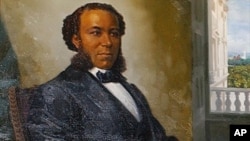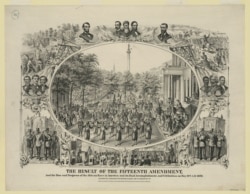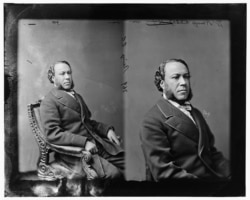Lorna Rainey can only imagine what it was like for her great-grandfather to walk into the U.S. Capitol in Washington, D.C., 151 years ago.
Against a backdrop of what many would consider insurmountable odds, Joseph Hayne Rainey, born enslaved, entered the Capitol building as the first African American member of the U.S House of Representatives in December 1870.
“I often think about what it must have felt like for him that very first day he walked into the Capitol into the assembly. And he was the only one, the only Black man,” Rainey told VOA. “My great-grandfather was prepared to be in Congress. He had a steel core but became a very moving figure through the years he was there,” she said.
Lorna Rainey was just 3 years old when her great-aunt began sharing stories about Joseph Rainey’s incredible place in history.
“It just fascinated me to know he rose from slavery, and 38 years later, he was elected a congressman. How can that be?” Rainey said. “You know, there was something inside of him that said, ‘I’m not going to quit, and once I get to Washington, just watch what I’m going to do.’”
Even as America celebrates Black History Month, which ends next week, the individual accomplishments of African Americans like Joseph Rainey are often overlooked. Now, his service to the country is beginning to receive greater recognition.
“Joseph Rainey is someone who can be described as the founding father of our nation,” said Bobby Donaldson, a history professor at the University of South Carolina. “He literally helped to rebuild this country in the aftermath of the Civil War and helped to envision a nation following emancipation during this extraordinary era called Reconstruction,” Donaldson told VOA.
Early life
Joseph Rainey was born in 1832 in Georgetown, South Carolina. His father used his earnings as a barber to buy the family’s freedom in the 1840s. The younger Rainey became a barber, as well, catering to a clientele of white southerners.
During the Civil War, he was drafted by the Confederacy to do hard labor but escaped to Bermuda, where he and his wife started a business.
“Some of his abolitionist friends, and probably his former barbershop customers, helped spirit him out of Charleston and get him to Bermuda,” Lorna Rainey told VOA.
Her great-grandfather returned to South Carolina in 1866 to launch his political career. Records suggest he was determined to help rebuild the country after the war.
A Republican, he was elected to the South Carolina legislature and helped craft a new state constitution that defended the equality of citizens.
“One of the things that was a direct result of the 1868 constitution was the notion of free public education for all citizens. And Joseph Rainey helped to shape that,” Donaldson said.
As a U.S. representative, Joseph Rainey championed civil rights, education and economic opportunity for all. He served nine years and inspired the political careers of some 15 African Americans who served in Congress during the 10-year Reconstruction period after the Civil War.
He was an early advocate of two pivotal landmark civil rights protections to the United States Constitution — the 14th Amendment, which gave full citizenship (and equal protection of the laws) to all people born in America, including former African slaves; and the 15th Amendment, which prohibited the federal government and states from denying a citizen the right to vote based on “race, color, or previous condition of servitude.”
“Rainey was trying to navigate around very obvious obstacles of white supremacy and racial injustice, even though he is one of the most powerful and most popular African-Americans in the country,” Donaldson noted.
Changing times
Rainey’s political career ended after he lost reelection in 1878.
In the late 19th century, repressive “Jim Crow” laws were enacted across the U.S. South by state legislatures controlled by white Democrats. The ordinances enforced racial segregation, and disenfranchised and took away political gains made by African Americans during Reconstruction.
“His Black supporters were prevented from voting for him,” Donaldson told VOA. “In South Carolina, there was an effort by white Democrats to intimidate Black voters by violent means.”
In his farewell address to fellow lawmakers in 1879, Rainey warned of trouble ahead.
“Within a short duration of time, everything he predicted was happening, as African Americans across the South lost their positions, lost their land and lost their power to vote,” Donaldson said.
Keeping the legacy alive
Last year, the U.S. House of Representatives named a Capitol building room after Rainey and paid tribute to him with a portrait that hangs in the halls of Congress.
“There was a deliberate effort by very notable historians to undermine, to marginalize, to erase people like Joseph Rainey from the history books. Now, he’s getting the type of attention he rightly deserves,” said Donaldson.
“He laid the foundation for generations of Black lawmakers to serve in Congress,” said South Carolina Congressman James Clyburn, who as House majority whip is the most powerful African American in the House of Representatives. “I’ve always worshipped Joseph Rainey.”
For her part, Lorna Rainey is producing a documentary about her great-grandfather.
“We must tell the world about his accomplishments,” she said. “I think Joseph Rainey’s life can inspire people to dig deep within, understand what you want to accomplish, never give up, and never surrender.”
Editor's note: This article has been corrected to reflect that Joseph Rainey's father bought the family's freedom in the 1840s, not in the 1940s, as had been erroneously stated.






